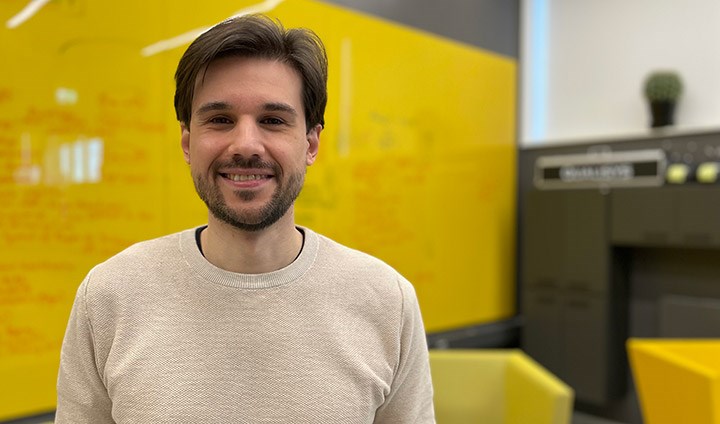His research looks at cyber security and ransomware in IT systems

Alberto Giaretta left Italy to take up a position as postdoctoral researcher at Örebro University. The main difference between university studies in the two countries is the slightly different approach to theory and practice.
“I’ve noticed that students in Sweden gain more hands-on experience in terms of technology than I did when I was a student in Italy,” he says.
Name: Alberto Giaretta
Age: 34
Have previously worked as: courier deliverer, warehouse worker, responsible for general office duties
Things people may not know about me: I’m a pretty good cook.
You are a postdoctoral researcher at the research environment Centre for Applied Autonomous Sensor Systems, AASS. What are you working on right now?
In the last months, we have gone through an intense period of project proposals writing. We always aim to finance all the ideas that we have at AASS, but the more ideas we fund, the more ideas we have. From the point of view of research, I’m involved in different topics, such as investigating the cybersecurity challenges of developing a fully autonomous airport, and proposing new techniques for detecting ransomware attacks on IT systems.
Your previous research includes DNA data storage. What is so appealing about the ability to store digital information in bacteria rather than on a hard drive?
Indeed, one of my research interests lies within the area of molecular communication and nanonetworks. One of the main selling points of storing information within DNA is storing capacity: 1 gram of DNA can store approximately 215 petabytes (i.e., around 1 million gigabytes). On the negative side, storing and retrieving such information is a slow process, with respect to what we are used to with electronic devices. Therefore, to date, DNA is a promising solution for long-term backup storage.
You were a student at University of Padova in Italy. What would you say are the main differences in terms of working and teaching in Örebro compared to in Padova?
The main difference that I can point out between Italy and Sweden, in terms of university experience, relates to the different focus on theory and practice. I can only speak for Computer Science, as my experience is limited to my field, but in Italy the curricula are extremely theoretical and oriented towards fundamental basic research. In Sweden, I’ve noticed that the students gain more hands-on the technology than I did when I studied in Italy. For example, the number of labs in Sweden is much higher than the ones we had in Italy.
What are the main challenges in your job?
Keeping yourself motivated and somewhat organised. I have to take care of a lot of things in my day-to-day routine, with papers to read and review, manuscripts and project proposals to write, courses to prepare and then exams to grade. All of this, while emails are relentlessly piling up. I find myself multitasking more than I should, more often than I would like to admit. I still have to master the art of being more systematic.
What do you like to do in your spare time?
Does working count as spare time? If not, I’m an avid reader and I love to hike when I get the chance to do it. Particularly on the Dolomites, close to my hometown in Italy.
Text: Alberto Giaretta and Anna Asplund
Photo: Susanne Skagersten
Translation: Charlotta Hambre-Knight
